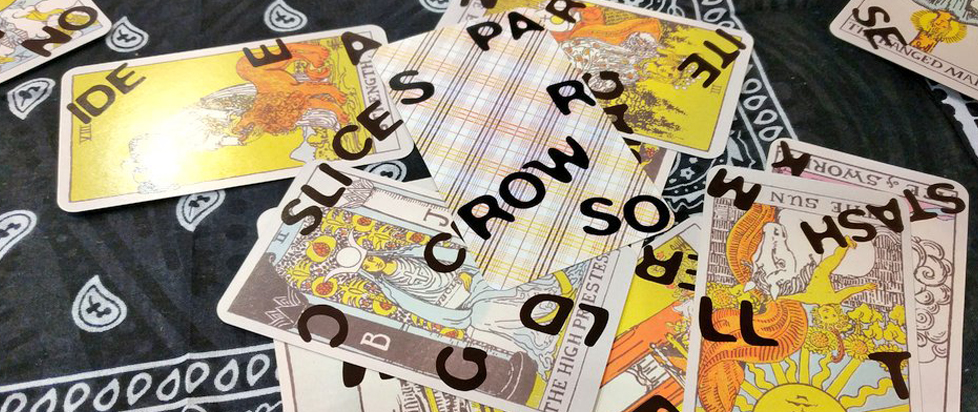
To Better Know that Death
Tarot is back, not that it ever really left, along with lunar phases, planetary alignment, star charts, birth year signs, and so on. These were the instruments of psychology before such a science was codified, metaphors of our internal strife that have always served creativity as much as peace of mind, though a huckster’s hand could use them to slip all the bills from your fold before their personalized predictions ever approached reality. I’ve watched brilliant friends commune with a Ouija board, begging lost spirits to help us help them, or check in with their daily spread, wondering for a long while what could possibly have been gained. It took time for me to see the meditative reflection, the chance to express inner turmoils at a distance, like enjoying a brief astrally projected smoke break from one’s self in order to better consider that self.
Still, I forget that to a lot of people, tarot holds otherworldly power that demands respect. These fine folks are the kind to be wary of a game like …and then we died, an elegant tarot-based end-of-the-party storytelling game from Killjoy, because it’s essentially the major arcana desecrated with an assortment of letters and phonemes. To some the setup might smack of disrespect, a spiritual slap in the face to the inexplicable energy that swirls around us, defacing a century-old system by which many communicate with themselves and their higher powers. I can see how one might be so trepidatious, though personally I think that energy is happy to accommodate our communicative needs over the status of ink swept over cardboard.
[pullquote]A random card is drawn to the table, and the first player plays a card on top to create a word from the displayed letters between the two. Then they spin the first yard of their ill fate, which must include the word they’ve spelled.[/pullquote]
Tarot is the ideal vehicle for …and then we died because the game is a late-night, neon-lit clandestine and playful confrontation of our own fears of death. The premise rests on literalizing the “exquisite corpse” game invented by the surrealists, that creative telephone line connecting our most disparate thoughts, where a group of players describes how their own collectively beautiful remains came to be. A random card is drawn to the table, and the first player plays a card on top to create a word from the displayed letters between the two. Then they spin the first yard of their ill fate, which must include the word they’ve spelled. It’s not exactly how they died but the raising of the curtains, and the next player cuts to the following scene by adding their own card and word and building it up from there.
One might be compelled to “yes, and” this kind of narrative as a way to grease the collaborative story, which is perfectly fine, but this is the kind of space that allows cracked and splintered memory to struggle out. The story ebbs and throbs around the table, with plenty of near-misses and potential foreshadowing. We look to tarot to frame the story of our lives, which are often too massive to encapsulate tidily, which is exactly what …and then we died does as well. This game just assumes what we all know, that our ultimate reward is coming. Some people confront this apprehension of death through strict denial, borrowing against the bill collector until there’s nothing left to mortgage. But I find that …and then we died takes the heat off, lessens the pressure of our shared fate, by letting us shatter the severity of the only guarantee in life. And we do it like we’ve done many of the great and terrible things in this world: as a group.
[pullquote]We’re flirting with absurdity to make the void that much more approachable.[/pullquote]
I don’t think this game messes with the juju of tarot. By using the major arcana to scaffold the eulogy, there’s a respectful bow to its transitive property – rather than pretending to predict or shape the future by will, it’s an acceptance of death, the one guaranteed prediction. We’re flirting with absurdity to make the void that much more approachable. And on a game night level, it’s a way to get woozy once everyone’s cogitated too much.
…and then we died gets you riffing on darkness, bullshitting into the night through telling a shared story. It’s simple and clean, with just a whiff of the eldritch, enough to pay tribute to the spindly forces of fate that lash us across this earth, to better know that death which also makes us feel alive.





